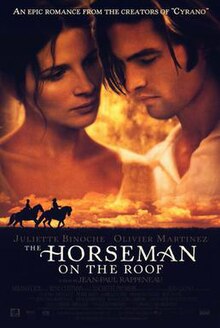The Horseman on the Roof
| The Horseman on the Roof | |
|---|---|

Theatrical release poster
|
|
| Directed by | Jean-Paul Rappeneau |
| Produced by | Bernard Bouix |
| Screenplay by |
|
| Based on |
The Horseman on the Roof by Jean Giono |
| Starring | |
| Narrated by | Jacques Weber |
| Music by | Jean-Claude Petit |
| Cinematography | Thierry Arbogast |
| Edited by | Noëlle Boisson |
|
Production
company |
|
| Distributed by |
|
|
Release date
|
|
|
Running time
|
135 minutes |
| Country | France |
| Language |
|
| Budget | $26,8 million |
| Box office | $23,2 million |
The Horseman on the Roof (French: Le hussard sur le toit) is a 1995 French film directed by Jean-Paul Rappeneau and starring Juliette Binoche and Olivier Martinez. Based on the 1951 French novel Le hussard sur le toit by Jean Giono, the film follows the adventures of a young Italian nobleman in France raising money for the Italian revolution against Austria during a time of cholera. The Italian struggle for independence and the cholera pandemic in southern France in 1832 are historical events. The film received César Awards in 1996 for Best Cinematography and Best Sound, as well as eight César Award nominations for Best Film, Best Costume Design, Best Actress, Best Director, Best Editing, Best Music, Best Production Design, and Most Promising Actress.
In July 1832, Italian patriots hiding out in Aix, France, are betrayed by one of their own, and Austrian agents are on their trail. One patriot, Giacomo, is dragged away and executed. His wife runs off to warn their friend, Angelo Pardi (Olivier Martinez), a young Italian nobleman in France raising money for the Italian revolution against Austria. As the agents descend on his apartment, Angelo escapes into the countryside.
At Meyrargues, Angelo looks for his compatriot and childhood friend, Maggionari, and then continues on to another village, where he writes to his mother, "Always fleeing. When can I fight and show what your son can do?" His mother purchased his commission as a colonel in the Piedmont Hussars, and he's never seen battle. Angelo encounters Maggionari, who turns out to be the traitor. When the Austrian agents arrive, Angelo fights them off and escapes.
The next day, Angelo enters a village ravaged by a cholera epidemic. The sight of the corpses abandoned to the scavenging crows sickens him. He meets a country physician, who shows him how to treat cholera victims by vigorously rubbing alcohol on the skin. Angelo continues north, passing a small village where corpses are being burned. He meets a young woman and two children and accompanies them to the outskirts of Manosque. The young woman, who is a tutor and lover of books, gives him a copy of Rinaldo and Armida as a parting gift.
...
Wikipedia
